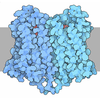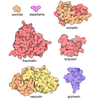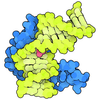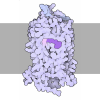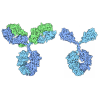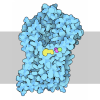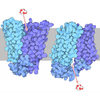[English] 日本語
 Yorodumi
Yorodumi- PDB-5olh: Structure of the A2A-StaR2-bRIL562-Vipadenant complex at 2.6A obt... -
+ Open data
Open data
- Basic information
Basic information
| Entry | Database: PDB / ID: 5olh | ||||||
|---|---|---|---|---|---|---|---|
| Title | Structure of the A2A-StaR2-bRIL562-Vipadenant complex at 2.6A obtained from in meso soaking experiments. | ||||||
 Components Components | Adenosine receptor A2a,Soluble cytochrome b562,Adenosine receptor A2a | ||||||
 Keywords Keywords | MEMBRANE PROTEIN / G-Protein Coupled Receptor / Adenosine 2a receptor / 7 TM integral membrane protein / thermostabilizing mutations | ||||||
| Function / homology |  Function and homology information Function and homology informationregulation of norepinephrine secretion / positive regulation of acetylcholine secretion, neurotransmission / negative regulation of alpha-beta T cell activation / positive regulation of circadian sleep/wake cycle, sleep / Adenosine P1 receptors / G protein-coupled adenosine receptor activity / response to purine-containing compound / G protein-coupled adenosine receptor signaling pathway / NGF-independant TRKA activation / Surfactant metabolism ...regulation of norepinephrine secretion / positive regulation of acetylcholine secretion, neurotransmission / negative regulation of alpha-beta T cell activation / positive regulation of circadian sleep/wake cycle, sleep / Adenosine P1 receptors / G protein-coupled adenosine receptor activity / response to purine-containing compound / G protein-coupled adenosine receptor signaling pathway / NGF-independant TRKA activation / Surfactant metabolism / sensory perception / synaptic transmission, dopaminergic / type 5 metabotropic glutamate receptor binding / negative regulation of vascular permeability / synaptic transmission, cholinergic / intermediate filament / presynaptic active zone / positive regulation of glutamate secretion / positive regulation of urine volume / blood circulation / response to caffeine / eating behavior / inhibitory postsynaptic potential / alpha-actinin binding / regulation of calcium ion transport / asymmetric synapse / axolemma / membrane depolarization / prepulse inhibition / cellular defense response / phagocytosis / positive regulation of synaptic transmission, glutamatergic / neuron projection morphogenesis / astrocyte activation / presynaptic modulation of chemical synaptic transmission / central nervous system development / response to amphetamine / positive regulation of long-term synaptic potentiation / positive regulation of synaptic transmission, GABAergic / positive regulation of protein secretion / regulation of mitochondrial membrane potential / positive regulation of apoptotic signaling pathway / synaptic transmission, glutamatergic / excitatory postsynaptic potential / locomotory behavior / apoptotic signaling pathway / electron transport chain / negative regulation of inflammatory response / vasodilation / adenylate cyclase-modulating G protein-coupled receptor signaling pathway / adenylate cyclase-activating G protein-coupled receptor signaling pathway / blood coagulation / cell-cell signaling / presynaptic membrane / G alpha (s) signalling events / phospholipase C-activating G protein-coupled receptor signaling pathway / negative regulation of neuron apoptotic process / postsynaptic membrane / calmodulin binding / electron transfer activity / periplasmic space / positive regulation of ERK1 and ERK2 cascade / iron ion binding / response to xenobiotic stimulus / inflammatory response / negative regulation of cell population proliferation / neuronal cell body / apoptotic process / heme binding / dendrite / regulation of DNA-templated transcription / lipid binding / protein-containing complex binding / glutamatergic synapse / enzyme binding / identical protein binding / membrane / plasma membrane Similarity search - Function | ||||||
| Biological species |  Homo sapiens (human) Homo sapiens (human) | ||||||
| Method |  X-RAY DIFFRACTION / X-RAY DIFFRACTION /  SYNCHROTRON / SYNCHROTRON /  MOLECULAR REPLACEMENT / Resolution: 2.6 Å MOLECULAR REPLACEMENT / Resolution: 2.6 Å | ||||||
 Authors Authors | Rucktooa, P. / Cheng, R.K.Y. / Segala, E. / Geng, T. / Errey, J.C. / Brown, G.A. / Cooke, R. / Marshall, F.H. / Dore, A.S. | ||||||
| Funding support | 1items
| ||||||
 Citation Citation |  Journal: Sci Rep / Year: 2018 Journal: Sci Rep / Year: 2018Title: Towards high throughput GPCR crystallography: In Meso soaking of Adenosine A2A Receptor crystals. Authors: Rucktooa, P. / Cheng, R.K.Y. / Segala, E. / Geng, T. / Errey, J.C. / Brown, G.A. / Cooke, R.M. / Marshall, F.H. / Dore, A.S. | ||||||
| History |
|
- Structure visualization
Structure visualization
| Structure viewer | Molecule:  Molmil Molmil Jmol/JSmol Jmol/JSmol |
|---|
- Downloads & links
Downloads & links
- Download
Download
| PDBx/mmCIF format |  5olh.cif.gz 5olh.cif.gz | 184.3 KB | Display |  PDBx/mmCIF format PDBx/mmCIF format |
|---|---|---|---|---|
| PDB format |  pdb5olh.ent.gz pdb5olh.ent.gz | 145.2 KB | Display |  PDB format PDB format |
| PDBx/mmJSON format |  5olh.json.gz 5olh.json.gz | Tree view |  PDBx/mmJSON format PDBx/mmJSON format | |
| Others |  Other downloads Other downloads |
-Validation report
| Arichive directory |  https://data.pdbj.org/pub/pdb/validation_reports/ol/5olh https://data.pdbj.org/pub/pdb/validation_reports/ol/5olh ftp://data.pdbj.org/pub/pdb/validation_reports/ol/5olh ftp://data.pdbj.org/pub/pdb/validation_reports/ol/5olh | HTTPS FTP |
|---|
-Related structure data
| Related structure data |  5olgC  5oloC  5olvC  5olzC  5om1C 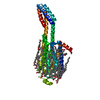 5om4C  5mzjS S: Starting model for refinement C: citing same article ( |
|---|---|
| Similar structure data |
- Links
Links
- Assembly
Assembly
| Deposited unit | 
| ||||||||
|---|---|---|---|---|---|---|---|---|---|
| 1 |
| ||||||||
| Unit cell |
|
- Components
Components
-Protein , 1 types, 1 molecules A
| #1: Protein | Mass: 48067.824 Da / Num. of mol.: 1 Mutation: A54L; T88A; R107A; K122A; L202A; L235A; V239A; S277A; N154A,A54L; T88A; R107A; K122A; L202A; L235A; V239A; S277A; N154A,A54L; T88A; R107A; K122A; L202A; L235A; V239A; S277A; N154A,A54L; ...Mutation: A54L; T88A; R107A; K122A; L202A; L235A; V239A; S277A; N154A,A54L; T88A; R107A; K122A; L202A; L235A; V239A; S277A; N154A,A54L; T88A; R107A; K122A; L202A; L235A; V239A; S277A; N154A,A54L; T88A; R107A; K122A; L202A; L235A; V239A; S277A; N154A,A54L; T88A; R107A; K122A; L202A; L235A; V239A; S277A; N154A,A54L; T88A; R107A; K122A; L202A; L235A; V239A; S277A; N154A,A54L; T88A; R107A; K122A; L202A; L235A; V239A; S277A; N154A,A54L; T88A; R107A; K122A; L202A; L235A; V239A; S277A; N154A,A54L; T88A; R107A; K122A; L202A; L235A; V239A; S277A; N154A,A54L; T88A; R107A; K122A; L202A; L235A; V239A; S277A; N154A,A54L; T88A; R107A; K122A; L202A; L235A; V239A; S277A; N154A,A54L; T88A; R107A; K122A; L202A; L235A; V239A; S277A; N154A,A54L; T88A; R107A; K122A; L202A; L235A; V239A; S277A; N154A,A54L; T88A; R107A; K122A; L202A; L235A; V239A; S277A; N154A,A54L; T88A; R107A; K122A; L202A; L235A; V239A; S277A; N154A,A54L; T88A; R107A; K122A; L202A; L235A; V239A; S277A; N154A,A54L; T88A; R107A; K122A; L202A; L235A; V239A; S277A; N154A,A54L; T88A; R107A; K122A; L202A; L235A; V239A; S277A; N154A,A54L; T88A; R107A; K122A; L202A; L235A; V239A; S277A; N154A,A54L; T88A; R107A; K122A; L202A; L235A; V239A; S277A; N154A,A54L; T88A; R107A; K122A; L202A; L235A; V239A; S277A; N154A,A54L; T88A; R107A; K122A; L202A; L235A; V239A; S277A; N154A,A54L; T88A; R107A; K122A; L202A; L235A; V239A; S277A; N154A,A54L; T88A; R107A; K122A; L202A; L235A; V239A; S277A; N154A,A54L; T88A; R107A; K122A; L202A; L235A; V239A; S277A; N154A,A54L; T88A; R107A; K122A; L202A; L235A; V239A; S277A; N154A,A54L; T88A; R107A; K122A; L202A; L235A; V239A; S277A; N154A Source method: isolated from a genetically manipulated source Source: (gene. exp.)  Homo sapiens (human), (gene. exp.) Homo sapiens (human), (gene. exp.)  Gene: ADORA2A, ADORA2, cybC / Production host:  Trichoplusia ni (cabbage looper) / References: UniProt: P29274, UniProt: P0ABE7 Trichoplusia ni (cabbage looper) / References: UniProt: P29274, UniProt: P0ABE7 |
|---|
-Non-polymers , 6 types, 57 molecules 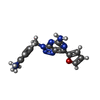
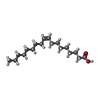

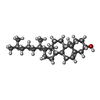
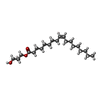






| #2: Chemical | ChemComp-9XT / | ||||||||
|---|---|---|---|---|---|---|---|---|---|
| #3: Chemical | ChemComp-OLA / #4: Chemical | ChemComp-NA / | #5: Chemical | #6: Chemical | ChemComp-OLC / ( #7: Water | ChemComp-HOH / | |
-Details
| Has protein modification | Y |
|---|
-Experimental details
-Experiment
| Experiment | Method:  X-RAY DIFFRACTION / Number of used crystals: 1 X-RAY DIFFRACTION / Number of used crystals: 1 |
|---|
- Sample preparation
Sample preparation
| Crystal | Density Matthews: 2.59 Å3/Da / Density % sol: 52.57 % |
|---|---|
| Crystal grow | Temperature: 293.15 K / Method: lipidic cubic phase Details: Crystal growth: 0.l M tri-sodium citrate pH 5.3-5.4, 0.05 M sodium thiocyanate, 29-32% PEG400, 2% (v/v) 2,5-hexanediol and 0.5 mM theophylline Vipadenant was added to the mother liquor to a ...Details: Crystal growth: 0.l M tri-sodium citrate pH 5.3-5.4, 0.05 M sodium thiocyanate, 29-32% PEG400, 2% (v/v) 2,5-hexanediol and 0.5 mM theophylline Vipadenant was added to the mother liquor to a concentration of 0.005 mM for the soaking experiments. PH range: 5.3-5.4 |
-Data collection
| Diffraction | Mean temperature: 100 K |
|---|---|
| Diffraction source | Source:  SYNCHROTRON / Site: SYNCHROTRON / Site:  SLS SLS  / Beamline: X06SA / Wavelength: 1 Å / Beamline: X06SA / Wavelength: 1 Å |
| Detector | Type: DECTRIS EIGER X 16M / Detector: PIXEL / Date: Apr 4, 2016 |
| Radiation | Monochromator: Si(111) / Protocol: SINGLE WAVELENGTH / Monochromatic (M) / Laue (L): M / Scattering type: x-ray |
| Radiation wavelength | Wavelength: 1 Å / Relative weight: 1 |
| Reflection | Resolution: 2.6→29.82 Å / Num. obs: 15853 / % possible obs: 99.5 % / Redundancy: 8.3 % / Biso Wilson estimate: 31.8 Å2 / Rmerge(I) obs: 0.248 / Net I/σ(I): 8.3 |
| Reflection shell | Resolution: 2.6→2.72 Å / Redundancy: 5.1 % / Rmerge(I) obs: 1.232 / Mean I/σ(I) obs: 1.8 / % possible all: 98.7 |
- Processing
Processing
| Software |
| ||||||||||||||||||||||||||||||||||||||||||||||||||||||||||||||||||||||||||||||||||||
|---|---|---|---|---|---|---|---|---|---|---|---|---|---|---|---|---|---|---|---|---|---|---|---|---|---|---|---|---|---|---|---|---|---|---|---|---|---|---|---|---|---|---|---|---|---|---|---|---|---|---|---|---|---|---|---|---|---|---|---|---|---|---|---|---|---|---|---|---|---|---|---|---|---|---|---|---|---|---|---|---|---|---|---|---|---|
| Refinement | Method to determine structure:  MOLECULAR REPLACEMENT MOLECULAR REPLACEMENTStarting model: 5MZJ Resolution: 2.6→29.82 Å / SU ML: 0.32 / Cross valid method: FREE R-VALUE / σ(F): 0.03 / Phase error: 23.44
| ||||||||||||||||||||||||||||||||||||||||||||||||||||||||||||||||||||||||||||||||||||
| Solvent computation | Shrinkage radii: 0.9 Å / VDW probe radii: 1.11 Å | ||||||||||||||||||||||||||||||||||||||||||||||||||||||||||||||||||||||||||||||||||||
| Displacement parameters | Biso mean: 44.21 Å2 | ||||||||||||||||||||||||||||||||||||||||||||||||||||||||||||||||||||||||||||||||||||
| Refinement step | Cycle: LAST / Resolution: 2.6→29.82 Å
| ||||||||||||||||||||||||||||||||||||||||||||||||||||||||||||||||||||||||||||||||||||
| Refine LS restraints |
| ||||||||||||||||||||||||||||||||||||||||||||||||||||||||||||||||||||||||||||||||||||
| LS refinement shell |
| ||||||||||||||||||||||||||||||||||||||||||||||||||||||||||||||||||||||||||||||||||||
| Refinement TLS params. | Method: refined / Refine-ID: X-RAY DIFFRACTION
| ||||||||||||||||||||||||||||||||||||||||||||||||||||||||||||||||||||||||||||||||||||
| Refinement TLS group |
|
 Movie
Movie Controller
Controller


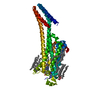


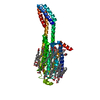
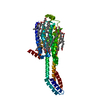

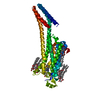

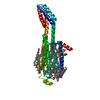
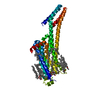
 PDBj
PDBj
